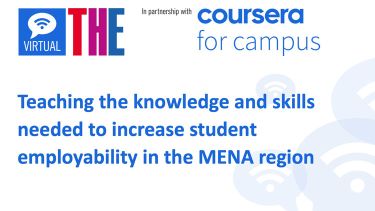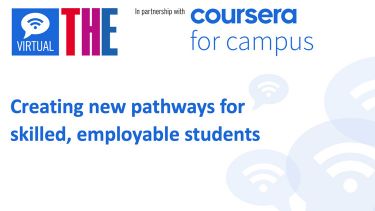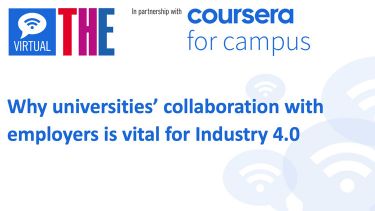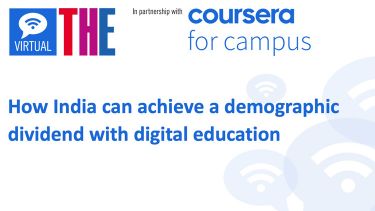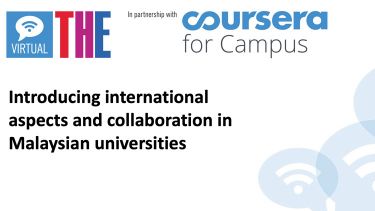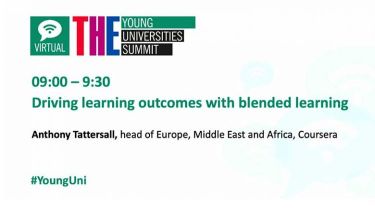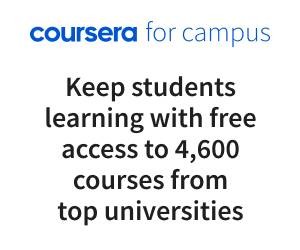Universities must identify and deliver the skills that employers demand of graduates in the age of automation
As the modern workplace changes, so too does the nature of work and the demands made of those who undertake it. The way higher education equips the workforce of tomorrow is an urgent matter for today.
At a digital round table, hosted by Times Higher Education in collaboration with Coursera, leading figures in Indian higher education offered their thoughts on Education 4.0 and what strategies could be taken to deliver new modes of teaching that supplement academic knowledge with skills-focused learning.
Opening the discussion, Raghav Gupta, managing director of India and APAC at Coursera, noted that, while Covid-19 was accelerating the rate of change in the workplace, digital transformation has been occurring for some time now. In 2019, he said, Coursera’s most popular courses covered technology use and development, algorithms and deep learning.
A year on, the most desired skills were writing and business strategy. “We are seeing people focus on self-management and working with others,” he said. “Skills around self-management – mindfulness, meditation and self-gratitude – are the kinds of skills people took on our platform [in 2020].”
The keyword is “skills”. Balvinder Shukla, vice-chancellor of Amity University, described how a major review of the curriculum in 2016 positioned industry-valued skills as a priority for Amity’s teaching. “The focus was creative skills, problem-solving skills and communication,” said Shukla. “The curriculum was designed and developed. Skills became the core of our whole academic philosophy.”
Amity’s Education 4.0 model proved its worth in the face of Covid-19. Strong industry partnerships and a technologically advanced infrastructure allowed its teaching to continue uninhibited by global restrictions. “Learning did not stop,” said Shukla. “From the next morning, we were able to move to the online mode of teaching using the various technology platforms and have our whole curriculum online.”
Sandeep Sancheti, former vice-chancellor of the SRM Institute of Science and Technology, stressed the importance of incorporating skills-based teaching into the curriculum. Education 4.0 gives students agency, he said, but also a responsibility to learn how to listen, to commit to learning skills at all stages in their career, and to have the ability to correct course in an uncertain world.
Not all institutions face the same task in preparing for Education 4.0, though. At the Goa Institute of Management, work placements and industry experience are essential. The institute’s director, Ajit Parulekar, said that technology has already transformed industries such as banking and healthcare, but such trends did not negate the need for human skills.
“The human skills are important,” said Parulekar. “It is not the idea of replacing one with another.” At the Goa Institute, internship programmes have increased from two-month to five-month placements, with data science and a revised banking and financial services programme rolled out to cater for an increasingly specialised sector.
But Education 4.0 is more than an industry-driven phenomenon. Technology has changed student expectations. Ajay Batish, deputy director of Thapar University, said that textbook learning was becoming obsolete in the digital age.
Over the past six years, Thapar has adopted an experiential model of teaching that is hugely popular with students, who might be presented with the task of disassembling then reassembling a Honda engine instead of listening to a lecture. This helps to build a design vocabulary with hands-on teaching that Thapar can build upon in later semesters.
“We asked civil engineering students to make a concrete canoe but make it float on water,” said Batish. “We are just asking them to think about how they can apply this knowledge in an engineering field.”
Underlining the importance placed on skills throughout the discussion, Batish noted that, while lessons are often forgotten upon graduating, skills can last a lifetime.
The panel:
- Ajay Batish, deputy director, Thapar University
- Raghav Gupta, managing director, India and APAC, Coursera
- Alistair Lawrence, special projects editor, Times Higher Education (chair)
- Shantanu Mishra, marketing manager, APAC, Coursera
- Ajit Parulekar, director, Goa Institute of Management
- Sandeep Sancheti, former vice-chancellor, SRM Institute of Science and Technology
- Balvinder Shukla, vice-chancellor, Amity University
Watch the round table above or on the THE Connect YouTube channel.
Find out more about Coursera and higher education.
















